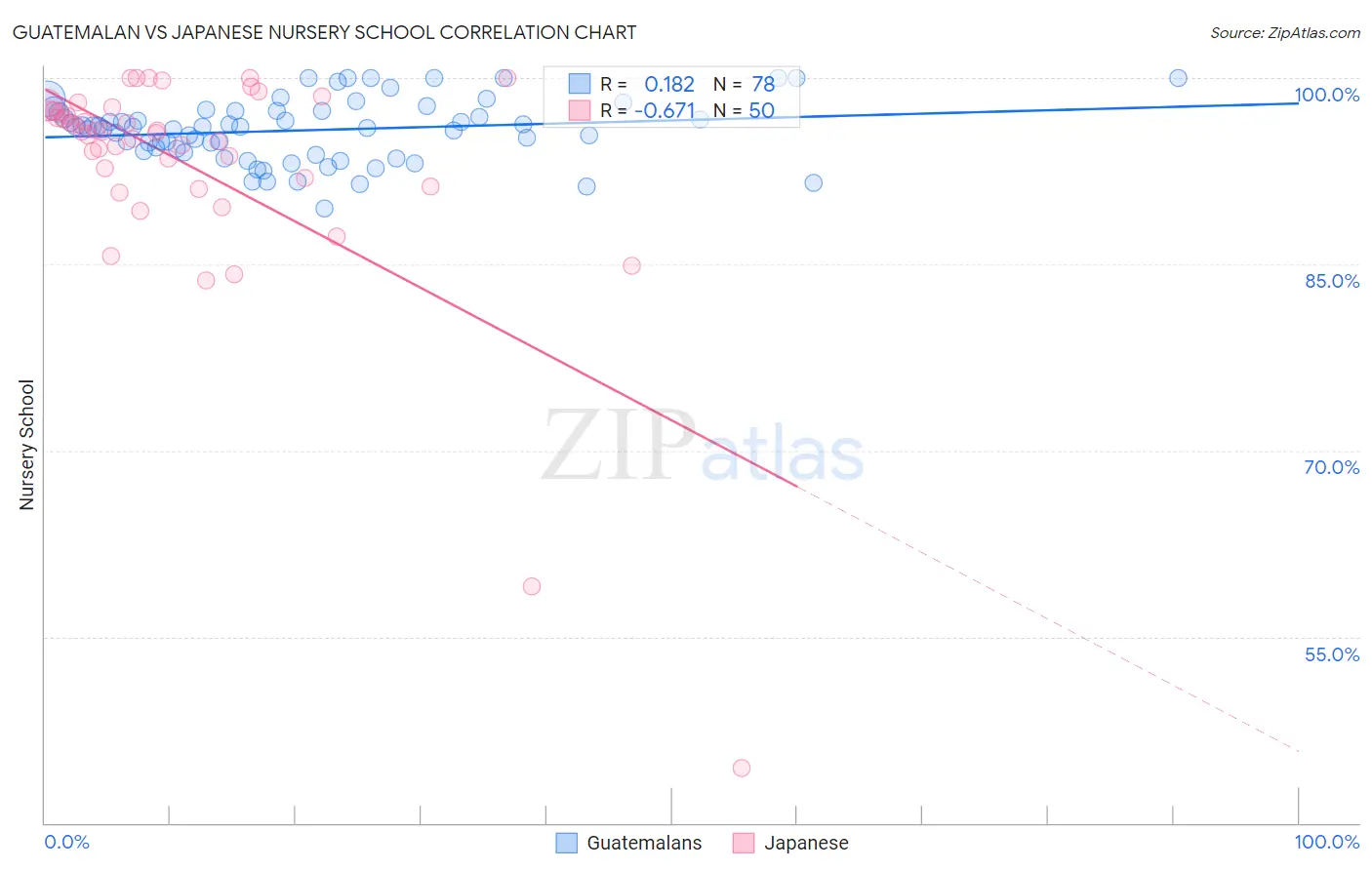Guatemalan vs Japanese Nursery School
COMPARE
Guatemalan
Japanese
Nursery School
Nursery School Comparison
Guatemalans
Japanese
96.6%
NURSERY SCHOOL
0.0/ 100
METRIC RATING
336th/ 347
METRIC RANK
96.7%
NURSERY SCHOOL
0.0/ 100
METRIC RATING
330th/ 347
METRIC RANK
Guatemalan vs Japanese Nursery School Correlation Chart
The statistical analysis conducted on geographies consisting of 409,566,469 people shows a poor positive correlation between the proportion of Guatemalans and percentage of population with at least nursery school education in the United States with a correlation coefficient (R) of 0.182 and weighted average of 96.6%. Similarly, the statistical analysis conducted on geographies consisting of 249,183,224 people shows a significant negative correlation between the proportion of Japanese and percentage of population with at least nursery school education in the United States with a correlation coefficient (R) of -0.671 and weighted average of 96.7%, a difference of 0.12%.

Nursery School Correlation Summary
| Measurement | Guatemalan | Japanese |
| Minimum | 89.4% | 44.4% |
| Maximum | 100.0% | 100.0% |
| Range | 10.6% | 55.6% |
| Mean | 95.8% | 93.0% |
| Median | 96.1% | 95.6% |
| Interquartile 25% (IQ1) | 94.1% | 92.0% |
| Interquartile 75% (IQ3) | 97.3% | 97.4% |
| Interquartile Range (IQR) | 3.2% | 5.4% |
| Standard Deviation (Sample) | 2.5% | 9.6% |
| Standard Deviation (Population) | 2.5% | 9.5% |
Demographics Similar to Guatemalans and Japanese by Nursery School
In terms of nursery school, the demographic groups most similar to Guatemalans are Bangladeshi (96.6%, a difference of 0.020%), Immigrants from Cambodia (96.5%, a difference of 0.040%), Immigrants from Fiji (96.5%, a difference of 0.040%), Immigrants from Dominican Republic (96.6%, a difference of 0.050%), and Central American (96.6%, a difference of 0.060%). Similarly, the demographic groups most similar to Japanese are Immigrants from Vietnam (96.7%, a difference of 0.010%), Immigrants from Armenia (96.7%, a difference of 0.020%), Yakama (96.6%, a difference of 0.040%), Immigrants from Latin America (96.7%, a difference of 0.060%), and Central American (96.6%, a difference of 0.060%).
| Demographics | Rating | Rank | Nursery School |
| Immigrants | Honduras | 0.0 /100 | #323 | Tragic 96.9% |
| Vietnamese | 0.0 /100 | #324 | Tragic 96.8% |
| Dominicans | 0.0 /100 | #325 | Tragic 96.8% |
| Indonesians | 0.0 /100 | #326 | Tragic 96.8% |
| Mexicans | 0.0 /100 | #327 | Tragic 96.8% |
| Immigrants | Latin America | 0.0 /100 | #328 | Tragic 96.7% |
| Immigrants | Vietnam | 0.0 /100 | #329 | Tragic 96.7% |
| Japanese | 0.0 /100 | #330 | Tragic 96.7% |
| Immigrants | Armenia | 0.0 /100 | #331 | Tragic 96.7% |
| Yakama | 0.0 /100 | #332 | Tragic 96.6% |
| Central Americans | 0.0 /100 | #333 | Tragic 96.6% |
| Immigrants | Dominican Republic | 0.0 /100 | #334 | Tragic 96.6% |
| Bangladeshis | 0.0 /100 | #335 | Tragic 96.6% |
| Guatemalans | 0.0 /100 | #336 | Tragic 96.6% |
| Immigrants | Cambodia | 0.0 /100 | #337 | Tragic 96.5% |
| Immigrants | Fiji | 0.0 /100 | #338 | Tragic 96.5% |
| Immigrants | Guatemala | 0.0 /100 | #339 | Tragic 96.4% |
| Immigrants | Central America | 0.0 /100 | #340 | Tragic 96.4% |
| Immigrants | Cabo Verde | 0.0 /100 | #341 | Tragic 96.4% |
| Immigrants | Mexico | 0.0 /100 | #342 | Tragic 96.4% |
| Salvadorans | 0.0 /100 | #343 | Tragic 96.4% |